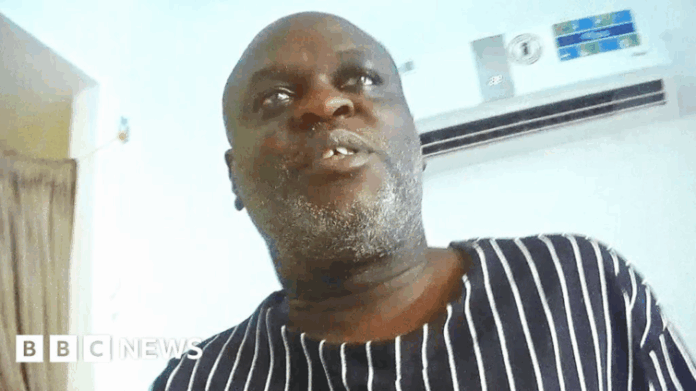A man running a sex ring operating out of Dubai’s most glamorous neighbourhoods, and exploiting vulnerable women, has been identified by a BBC investigation.
Charles Mwesigwa, who says he is a former London bus driver, told our undercover reporter he could provide women for a sex party at a starting price of $1,000 (£740), adding that many can do “pretty much everything” clients want them to.
Rumours of wild sex parties in the UAE emirate have circulated for years. The hashtag #Dubaiportapotty, which has been viewed more than 450 million times on TikTok, links to parodies and speculative exposés of women accused of being money-hungry influencers secretly funding their lifestyles by fulfilling the most excessive of sexual requests.
Our BBC World Service investigation was told the reality is even darker.
Young Ugandan women told us they had not expected to have to undertake sex work for Mr Mwesigwa. In some cases, they believed they were travelling to the UAE to work in places like supermarkets or hotels.
At least one of Mr Mwesigwa’s clients regularly asks to defecate on the women, according to “Mia”, whose name we have changed to protect her identity, and who says she was trapped by Mr Mwesigwa’s network.
Mr Mwesigwa denies the allegations. He says he helps women find accommodation through landlords, and that women follow him to parties because of his wealthy Dubai contacts.
We have also discovered that two women linked to Mr Mwesigwa have died, having fallen from high-rise apartments. Although their deaths were ruled as suicides, their friends and family feel the police should have investigated further.
Mr Mwesigwa said the incidents were investigated by the Dubai police and asked us to contact them for information. They did not reply to our request.
One of the women who lost her life, Monic Karungi, arrived in Dubai from western Uganda.
She found herself sharing a flat with dozens of other women working for Mr Mwesigwa, according to one of the women, who we are calling Keira, who says she lived with Monic there in 2022.
“[His] place was like a market… There were like 50 girls. She was not happy because what she expected is not what she got,” Keira told us.
Monic thought the job in Dubai was going to be in a supermarket, according to her sister Rita.
“He [Mr Mwesigwa] was violent when I told him I wanted to go back home,” says Mia, who also knew Monic in Dubai. She says that, when she first arrived, he told her she already owed him £2,000 ($2,711) and that, within two weeks, that debt had doubled.
“Money for air tickets, for your visa, for where you’re sleeping, food,” says Mia.
“That means you have to work hard, hard, hard, pleading for men to come and sleep [with] you.”
Monic owed Mr Mwesigwa more than $27,000 (£19,918) after several weeks, according to what a relative of hers we are calling Michael, says she told him. He adds that he received tearful voice notes from her.
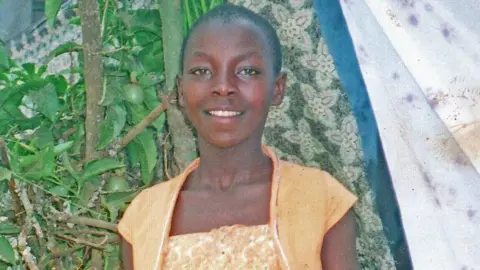
Mia told us that clients were mostly white Europeans, and included men with extreme fetishes.
“There’s this one client, he poops on girls. He poops and he tells them to eat the shit,” she explained quietly.
Another woman we are calling Lexi, who says she was tricked by a different network, echoed Mia’s story, saying “porta potty” requests were frequent.
“There was a client who said: ‘We pay you 15,000 Arab Emirates Dirham ($4,084, £3,013) to gang-rape you, pee in your face, beat you, and add in 5,000 ($1,361, £1,004)'” for being recorded eating faeces.
Her experiences have led her to believe there is a racial element to this extreme fetish.
“Every time I said that I wouldn’t want to do that, it seemed to get them more interested. They want somebody who is going to cry and scream and run. And that somebody [in their eyes] should be a black person.”
Lexi says she tried to get help from the only people she thought could intervene – the police. But she says they told her: “You Africans cause problems for each other. We don’t want to get involved. And they would hang up.”
We put this allegation to the Dubai police, and they did not reply.
Lexi eventually escaped back to Uganda and now helps to rescue and support women in similar situations.
Finding Charles Mwesigwa wasn’t easy. We could only find one picture of him online – and it was taken from behind. He also uses multiple names across social media.
But through a combination of open-source intelligence, undercover research, and information from a former member of his network, we traced him to a middle class neighbourhood in Dubai – Jumeirah Village Circle.
To corroborate what sources had told us about his business – supplying women for degrading sex acts – we sent in an undercover reporter posing as an event organiser sourcing women for high-end parties.
Mr Mwesigwa appeared calm and confident when speaking about his business.
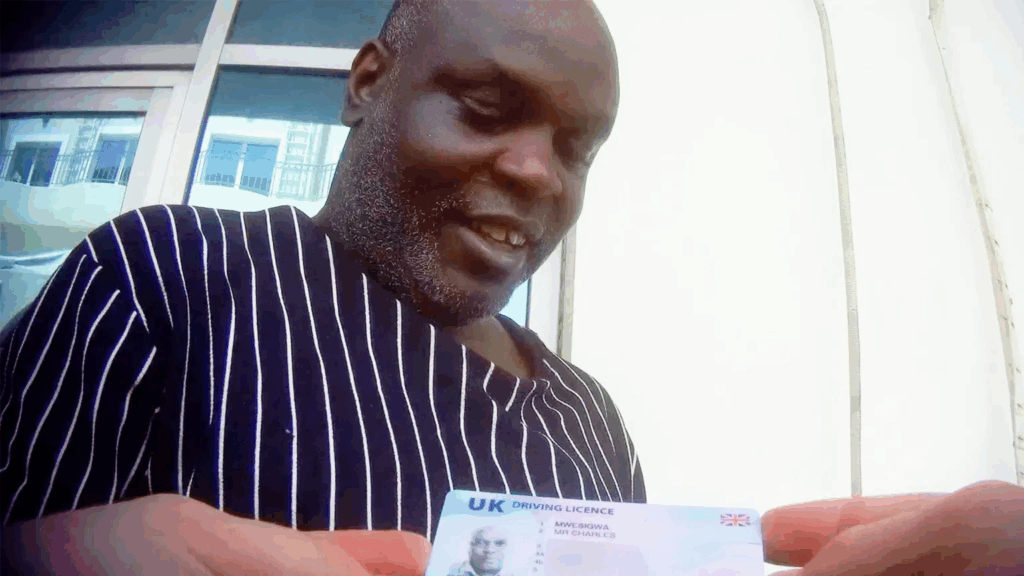
“We’ve got like 25 girls,” he said. “Many are open-minded… they can do pretty much everything.”
He explained the cost – from $1,000 (£738) per girl per night, but more for “crazy stuff”. He invited our reporter for a “sample night”.
When asked about “Dubai porta potty” he replied: “I’ve told you, they are open-minded. When I say open-minded… I will send you the craziest I have.”
In the course of the conversation, Mr Mwesigwa said he used to be a London bus driver. We have seen evidence that he put that occupation down on an official document in East London in 2006.
He went on to tell our reporter that he loved this business.
“I could win the lottery, a million pounds, but I would still do it… it’s become part of me.”
Troy, a man who says he used to act as operations manager for Mr Mwesigwa’s network, gave us more information about how he says it is run.
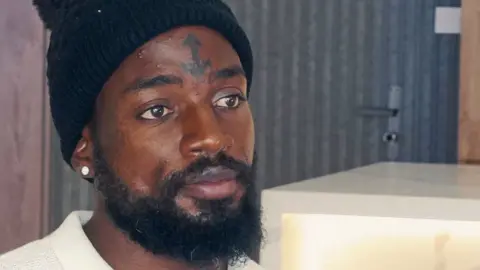
He says Mr Mwesigwa pays off security at various nightclubs so they will let his women in to find clients.
“I’ve heard about types of sex that I’ve never seen in my life. It doesn’t matter what you go through as long as his rich men are happy… [the women] have no escape route…They see musicians, they see footballers, they see presidents.”
Mr Mwesigwa has been able to get away with running this operation, Troy claims, because Troy and others are not just used as drivers. He says their names are also used by Mr Mwesigwa to hire cars and apartments, so that his own name never appears on the paperwork.
On 27 April 2022, Monic posted a selfie from Al Barsha – a residential neighbourhood popular with expats in Dubai. Four days later, she was dead. She had been in the emirate for just four months.
According to Mia, Monic and Mr Mwesigwa had been regularly arguing in the period before she left. Mia says Monic had been refusing to comply with Mr Mwesigwa’s demands and had found a way out of his network.
“She had got some kind of job. She was very excited. She thought she was gonna get free, she was going to get her life back because now that was a real job, no sleeping with men,” Mia says.
Monic moved out to a different apartment about 10 10-minute’ walk away. It was from this apartment’s balcony that she fell on 1 May 2022.

Monic’s relative Michael, who was in the UAE at the time she died, says he tried to get answers.
Police told him they stopped their investigation, having found drugs and alcohol in the apartment Monic had fallen from, and only her fingerprints on the balcony, he says.
He obtained a death certificate for Monic from a hospital, but it did not say how she had died. And her family were unable to obtain a toxicology report for her.
But a Ghanaian man living in the apartment building was more helpful, he says, taking him to another block to meet the man he said was Monic’s boss.
Michael describes the scene when he got there and saw where the women were housed.
He says that through the cloud of shisha smoke in the living room, he made out what looked like cocaine on the table and women having sex on chairs with clients.
He claims he found the man we had previously identified as Charles Mwesigwa in bed with two women, and that when he tried to drag him to the police, Mr Mwesigwa replied: “I have spent 25 years in Dubai. Dubai is mine… There is no way you are going to report me… Embassy is me, I’m the embassy.
“[Monic’s] not the first to die. And she won’t be the last,” he added, according to Michael.
Mia and Keira both independently say they witnessed this conversation and both confirm its wording. When we asked Mr Mwesigwa what he meant by this, he denied having said it.
Monic’s death shares haunting similarities with that of Kayla Birungi, another Ugandan woman who lived in the same neighbourhood as her, and died in 2021 after falling from a Dubai high-rise apartment which we have evidence to suggest was managed by Charles Mwesigwa.
The phone number for her landlord, shared with us by Kayla’s family, turned out to be one of Mr Mwesigwa’s numbers. Troy also confirms that Mr Mwesigwa managed the apartment, as do four other women we spoke to for this investigation.

Kayla’s relatives say that they – like Monic’s family – heard Kayla’s death had been linked to alcohol and drugs. But a toxicology report seen by the BBC shows none were present in her system at the time of her death.
While Kayla’s family was able to repatriate her body and hold a burial, Monic’s remains were never returned.
Our investigation found she was likely buried in a section of Dubai’s Al Qusais Cemetery known as “The Unknown”. It features rows and rows of unmarked graves, typically thought to belong to migrants whose family couldn’t repatriate their bodies.
Monic and Kayla were part of a wider, unofficial pipeline connecting Uganda to the Gulf.
As Uganda wrestles with rising youth unemployment, moving to work abroad – mainly in the Gulf states – has become a huge industry that contributes $1.2bn (£885m) of tax revenue to the country each year.
But these opportunities can carry a risk.
Mariam Mwiza, a Ugandan activist against exploitation, says she has helped rescue more than 700 people from around the Gulf.
“We get cases of people who have been promised to work, let’s say, in a supermarket. Then [that person] ends up sold as a prostitute,” she told us.
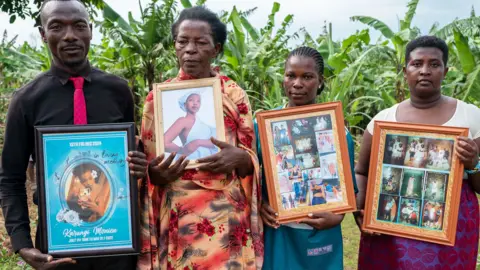
For Monic’s family, grief is now tangled with fear. Fear for other families who could suffer the same loss they have, if nothing is done.
“We are all looking at Monica’s death,” her relative Michael told us. “But who is there for the girls still alive? They’re still there. Still suffering.”
The BBC asked Charles “Abbey” Mwesigwa to respond to all the allegations made in our investigation. He denied running an illegal prostitution ring.
He said: “These are all false allegations.
“I told you I am just a party person who invites big spenders to my tables, hence making many girls flock [to] my table. That makes me know many girls, and that’s it.”
He also said: “[Monic] died with her passport, meaning no one was demanding her money for taking her. Prior to her death, I hadn’t seen her for over four to five weeks.
“I knew [Monic and Kayla] and [they] were renting with different landlords. If no one in both flats was arrested or any of the landlords, then there was a reason. Both incidents were investigated by the Dubai police and maybe they can help you.”
The BBC contacted Al Barsha Police Station to request to see the case files for Monic Karungi and Kayla Birungi. It did not respond to that request or to allegations Monica and Kayla’s deaths had not been properly investigated.
The BBC was unable to see any toxicology reports in relation to Monic Karungi, or speak to the landlord of the apartment in which she was living when she died.

